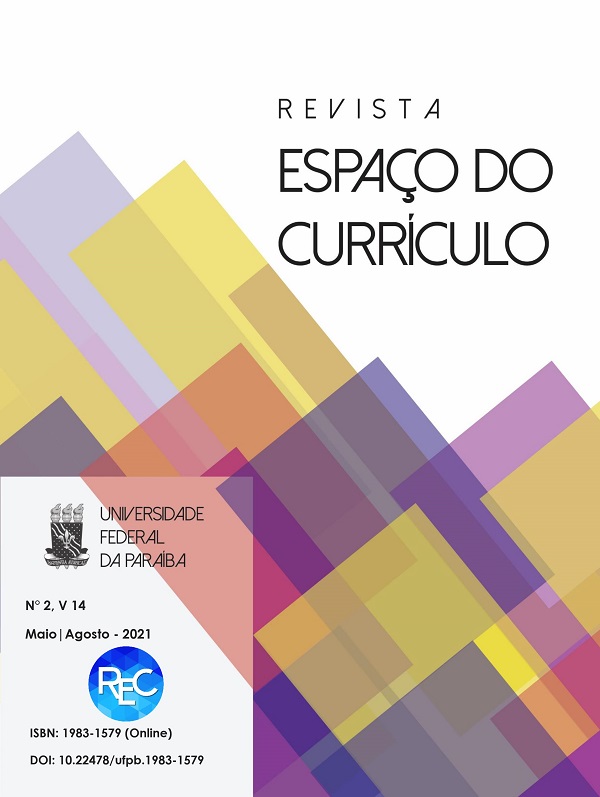KNOWLEDGE SILENCED BY THE CURRICULUM
epistemology and curriculum in Field Education
DOI:
https://doi.org/10.22478/ufpb.1983-1579.2021v14n2.57814Keywords:
Epistemology of the South, Curriculum, Countryside educationAbstract
This work instigates an analysis of a critical, emancipatory, humanizing and holistic curriculum that respects the knowledge of the subjects in the field, through their identity and cultural difference. The objective is to analyze the theoretical tensions about the studies of southern epistemologies and how they aggregate the struggles and actions in the field of the curriculum. This is a bibliographic research, based on authors such as Arroyo (2013), Oliveira (2012), Santomé (1995), Santos (2002; 2018) among others. The work illustrates theoretical discussions and documentary analysis that address the theme "Curriculum", "Southern epistemology" and "Rural education". As a result, the article inferred that curricular epistemologies must be linked to cultural issues and knowledge that condition the particularities and the sociocultural history of the subject of the field, in order to instigate them to understand the social structures that oppress them, in view the elaboration of action strategies with probability of success for its emancipation.
Downloads
Metrics
References
ARROYO, M. G. Prefácio. Escola: terra de direito. In: ROCHA, M. I. A.; HAGE, S. M. Escola de direito: reinventando a escola multisseriada. Belo Horizonte: Autêntica, 2010 (Coleção Caminhos da Educação do Campo)
ARROYO, M. G; CALDART, R. S.; MOLINA, M. C. Por uma educação do campo. 3. ed. Petrópolis, RJ: Vozes, 2008.
ARROYO, M. G. Currículo, território em disputa. 5. ed. Petrópolis, RJ: Vozes, 2013.
BASÍLIO, G. Os saberes locais e o novo currículo do Ensino Básico. Dissertação de Mestrado em Educação pela Pontifícia Universidade Católica de São Paulo em convênio com a Universidade Pedagógica de Moçambique, 2006.
BRASIL. Resolução n. 01 CNE/CEB. Diretrizes operacionais para educação básica nas escolas do campo. Brasília: CNE, 2002.
CALDART, R. S. Por uma educação do campo: traços de uma identidade em construção. In: Educação do campo: identidade e políticas públicas – Caderno 4. Brasília: Articulação Nacional “Por uma Educação do Campo”, 2002.
FURTADO, L. S.; CARMO, E. S. Para uma pedagogia cultural: o currículo e sua relação com a educação ribeirinha na Amazônia. Revista e-Curriculum, São Paulo, v.18, n.4, p. 1712-1732 out./dez. 2020
GEERTZ, C. O saber local: novos ensaios em antropologia interpretativa. Tradução de Vera Mello Joscelyne. Petrópolis, Vozes, 1997, 366 p.
MOREIRA, A. F.; TADEU, T. Currículo, cultura e sociedade (Orgs.). 12.ed. São Paulo: Cortez, 2013.
OLIVEIRA, I. B. Criação curricular, autoformação e formação continuada no cotidiano escolar. In: Ferraço, C. E. (org.). Cotidiano escolar, formação de professores/as e currículos. São Paulo: Cortez, 2005.
OLIVEIRA, I. B. Contribuições de Boaventura de Sousa Santos para a reflexão curricular: princípios emancipatórios e currículos Pensadospraticados. Revista e-curriculum, São Paulo, v.8 n.2, Agosto 2012.
PIRES, E. T. Para uma pedagogia cultural da tradição: práticas de professores ribeirinhos na Ilha do Marajó. 2017. 150f. Dissertação (Mestrado) – Programa de Pós-Graduação em Educação em Ciências e Matemáticas (PPGECM), Universidade Federal do Pará, Belém (PA).
SANTOMÉ, J. T. As culturas negadas e silenciadas no currículo. In: SILVA, Tomaz Tadeu da. Alienígenas na sala de aula. Petrópolis, RJ: Vozes, 1995. p. 159-177.
SANTOS, B. S. Construindo as epistemologias do Sul. Antologia Essencial, v. I, COLEÇÃO ANTOLOGIA DO PENSAMENTO SOCIAL LATINO-AMERICANO E CARIBENHO, CLACSO, 2018. p. 297-335.
SANTOS, B. S. Para uma pedagogia do conflito. In: Silva, Luiz Heron; Azevedo, José Clóvis de; Santos, Edmilson Santos dos. Novos mapas culturais, novas perspectivas educacionais. Porto Alegre, 1996. p. 15-33.
SANTOS, B. S. Para uma sociologia das ausências e uma sociologia das emergências. Revista crítica de ciências sociais, 63, Outubro 2002. p. 237-280.
Downloads
Published
How to Cite
Issue
Section
License
Copyright (c) 2021 Curriculum Space Journal

This work is licensed under a Creative Commons Attribution 4.0 International License.
By submitting an article to Curriculum Space Journal (CSJ) and having it approved, the authors agree to assign, without remuneration, the following rights to Curriculum Space Journal: first publication rights and permission for CSJ to redistribute this article. article and its metadata to the indexing and reference services that its editors deem appropriate.
















